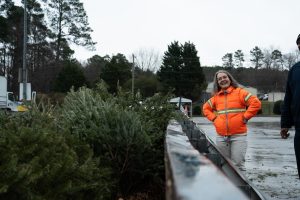At 3:17 a.m. the Rev. Ben Johnston-Krase jumped out of bed, scrambled for his iPad and started Googling — somebody must have thought of this idea before him.
He scoured the web, searching for a reason to go back to sleep and forget about it. Nothing came up.
Twenty minutes and $80 later, the domain name farmchurch.org was purchased. Johnston-Krase put away his iPad and went back to bed.
The next morning Johnston-Krase called his friend, the Rev. Allen Brimer, and told him everything.
“Well, that’s it then,” Brimer recalled saying. “We’re gonna have to get this right.”
That was 2014. Soon Johnston-Krase and Brimer found themselves sitting in front of the Presbyterian Church USA evaluation team in Atlanta, Georgia, asking to create a new farming-focused congregation. To their surprise, they were given a green light.
“Part of me wanted them to tell me no, no, no, don’t be a church planter. But that’s not what happened,” said Brimer.
The men created Farm Church, whose mission is to gather a Christian-centered community around food cultivation. Its special focus is food insecurity in Durham.

Inspiration
The idea for Farm Church came to Johnston-Krase in a dream. In it, he was taking a call to a church. When he got out of his car, there was no building, only people worshipping on a small plot of farmland. That’s when he woke up and frantically searched the internet.
Connecting to faith through cultivation was a concept that had been ruminating in both his and Brimer’s minds for some time.
Brimer caught the gardening bug in 1995, after stumbling upon an organic garden on a ranch where he was working as a camp counselor in New Mexico.
Growing food “woke up some ancient dragon in me that had been dormant,” he explained.
Brimer quit the counselor job and worked full-time in the garden that summer. The following summers he travelled to Arizona, Indiana and New Mexico to work on farms and learn as much as he could about growing food.
“I just started farming, farming, farming,” he said.
After acquiring the blessing of the Presbyterian Church, Johnston-Krase, Brimer, and their friend the Rev. Brandon Wert started a nationwide search for the perfect home for Farm Church.
They considered locations from California to New York. Durham, North Carolina, was the dark-horse candidate. None of the pastors knew anyone in the area. That meant they would have to build roots in the community from the ground up.
But when they came to visit, they fell in love. “We came to Durham and it just shined,” said Brimer.
There were also plenty of mouths to feed. Eighteen percent of people living in Durham are food insecure, according to research done by The Southeastern University Consortium for Food Security and Health. That adds up to over 50,000 people.
Moreover, mild winters here allow Farm Church’s congregation to spend lots of the year outside with their hands in the soil. And despite decades of development, the city is still surrounded by lots of open land, which Brimer hoped would make it easier to find space of their own.
So in August 2015 the men packed up their families and moved to Durham. Phase one was complete. Next they needed congregants. The following months they consumed excessive amounts of caffeine at local cafes like Mad Hatter’s and Beyu Blue and telling people what they were up to.
“We were constantly just going and meeting people and telling the story over and over and over,” Brimer said.
Each meeting led to three more people who might be interested in their vision, and then three more. One coffee conversation led them to connect with SEEDS, an urban garden and kitchen classroom on Gilbert Street.

Planting
On May 1, 2016, Farm Church hosted its first service at the SEEDS campus. Brimer offered a scripture passage while more than 60 people stood on the bare earth SEEDS shared with them. Then they got to work.
First on the agenda: Improving soil health.
“The first year in that garden, we were literally digging into red clay, like hard, dry red clay. It was awful,” said Anneke Oppewal, a middle school Spanish teacher who was one of Farm Church’s first congregation members.
Five years and several harvests later, the soil is rich and dark brown. And the congregation has grown. Anywhere between 70 to 100 people pass through Farm Church a week.
On Wednesdays, members spend the afternoon working on a tenth-acre plot on Watts Street. Anne Hodges-Copple, an associate bishop of the Episcopal church and a fellow gardening geek, offered them the land, Brimer said.
With no official building to its name, Farm Church attracts those looking for an unconventional religious community that offers an active worship experience. Something that feels productive and purposeful.
“It has attracted people who are spiritually curious, but institutionally suspicious,” said Mark McIntyre, a member of Farm Church since its founding.
Oppewal said she felt unfulfilled by her previous experiences of “normal” indoor church.
“It was all too easy to go in, sit down, stand up, leave. I was like, I think church is supposed to be more than this,” she said.
“Farm Church mixes this notion of practicing our faith life with doing something that’s actually physically useful to people as well. It satisfies not just a spiritual need, but a physical one,” said McIntyre.
Few people living in urban centers like Durham get to experience the satisfaction of defending precious crops from crowding weeds or watching shoots burst from seed capsules to stretch toward sunlight. Norman Wirzba, a professor of Christian theology at Duke Divinity School, believes such cultivation experiences take on spiritual meaning.
“When you look at scriptures, they’re all about God’s love for the land, God’s love for non-human creatures, God’s love for all human beings, and certainly God’s love for bodies,” he said. “That’s why you find Jesus constantly healing bodies, feeding bodies, befriending bodies, reconciling bodies, even exorcising the demons that are disfiguring bodies, because Jesus loves embodiment.”
Brimer, now head pastor, describes the garden as a “smorgasbord of metaphors” for Christian teachings. On Sundays, after Brimer reads and reflects on the scripture passage for the day, he ends with some meditative questions for the group.
“When is a time that you did the compassionate thing, even though it was the hard thing to do?,” he might ask. Or: “What does justice look like in the midst of a pandemic? What does mercy look like in the midst of the Black Lives Matter movement?”
With these questions in mind, Brimer walks members through the SEEDS gardens, pointing out plants with insect damage or encroaching weeds. He teaches skills, like how to harvest greens so they grow back stronger. The group then chooses what to prioritize and gets to work.
After working the land for 45 to 50 minutes, congregants step into an indoor space on the SEEDS campus for a break. They discuss the meditation questions and the scripture passage’s implications for their daily lives.
“I never thought weeding could be something spiritual,” said Oppewal. “That very much connected with me, the idea of taking things out that are not serving us to make room for things that will; that has been a big metaphor.”
After discussing scripture and Brimer’s questions, it’s time for communion liturgy — minus bread or wine these days due to COVID-19. Service ends after everyone shares joys or concerns from the week and Brimer says a final prayer.
People clean tools and head home.

Action
Farm Church members are passionate about food insecurity.
Radishes, lettuce, kale and the other foods that members grow are donated to local food banks, including one run by Iglesia Immanuel Presbyterian congregation, and to Mt. Zion Baptist Church’s food pantry. During the pandemic, they have helped efforts to feed Durham public school families who depend on free or reduced-price meals.
When bad weather keeps them home, they watch documentaries about food systems and join Zoom talks with others working to try to improve access to healthy food in Durham.
While the injection of fresh produce from Farm Church into Durham food sharing networks is a first step at helping, Brimer wants to go further.
Reducing food insecurity in Durham has been a humbling experience for many. Low-income, marginalized communities experience a higher risk of food insecurity in the U.S. and Durham is no exception.
Part of a predominantly white, middle-class congregation, Farm Church members acknowledge they are disconnected with the people most in need of assistance.
“Farm Church right now is very much a Band-Aid to very big and real problems that we can’t just address and be done with. We know that food insecurity stems from racism and poverty and health disparities, and these things that we can’t necessarily tackle,” said Oppenwal.
Plans are underway to develop a spot by a bus stop on Holloway Street where people can one day pick their own food while waiting for a ride. Brimer plans to seek out more people working on solutions and offer the church’s help, he said.
“We want to ask if we can accompany them solving the problem and keep asking: How can I be useful here?,” he said.
9th Street reporter Olivia Olsher can be reached at olivia.olsher@duke.edu
At top: A Farm Church fall harvest. Photo by Anneke Opewal
Olivia Olsher






